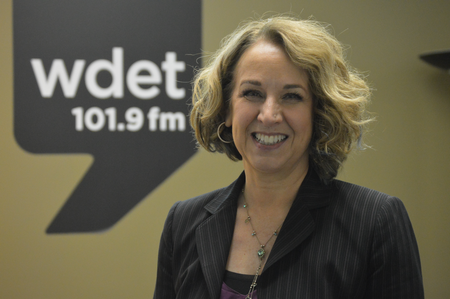Educators Need Help to Get Through This Unprecedented School Year
The COVID-19 pandemic has pushed America’s education system to the brink, with the government leaving students, teachers and schools to fend for themselves.

As the first semester of this school year comes to a close, many are taking stock of what was an unprecedented fall. The ongoing COVID-19 pandemic has wreaked havoc on schools and the very structure of the American education system. In an attempt to mitigate health risks, some school districts opted for exclusively remote learning while others offered a hybrid, in-person and remote, model.
No matter the set-up, schools, teachers, students, and administrators have all struggled to adjust to learning and teaching during the pandemic.
Listen: What we’ve learned from the 2020 school year so far.
Guests:

Dr. Elizabeth Moje, Dean of the University of Michigan’s School of Education, says that remote learning has been a challenge for all children, especially those without access to compatible technology. “We struggle to support young children in virtual environments in part because we rely so much on print even in a (virtual) environment. Young kids might not have reading skills to engage fully with text on a screen,” says Moje.
She adds that better tech tools could help the situation and hopes for better platforms and learning management systems to be implemented in the future. “We could be doing so much more to keep our children engaged,” says Moje. Financial investment and support from the government is needed, she says, to manage these learning inequalities exacerbated by the pandemic. “There’s no excuse for our (nation’s) failure to support families…and their students,” says Moje.
Justin Reich is an Assistant Professor in the Comparative Media Studies/Writing department at MIT and the director of the MIT Teaching Systems Lab. He is also the host of the Teach-Lab podcast and author of the book “Failure to Disrupt: Why Technology Alone Can’t Transform Education.” Reich says the pandemic has showcased how challenging online learning is and underscored the importance of in-person teachers. “For the past two decades education tech evangelists have made a series of dramatic claims (about learning via technology)… What we are seeing during the pandemic is that learning online is enormously difficult,” says Reich.
The change to remote learning, he says, has placed an enormous burden on teachers. “We are asking teachers to completely reinvent their practice… there just hasn’t been enough time for that (skillset transition),” says Reich. The move to online learning has also widened inequalities that have already existed in the education system for decades. According to Reich, failure rates among low-income students are going way up this fall compared to previous years.
Mark Greathead, superintendent of Woodhaven-Brownstown Schools and president of the K-12 Alliance of Michigan, says this school year started off promising and then quickly hit a roadblock. “We started the school year very strong… things got side railed when the number of cases began to increase… We are struggling to find the right short-term niche for our students and our community,” says Greathead.
Personnel and capital, he says, are the number one need for the school system moving forward. According to Greathead, prior to the pandemic, there was already an educator shortage. He says the scarcity of resources compounds every issue that schools are currently facing.
This post was written by Clare Brennan
Trusted, accurate, up-to-date
WDET is here to keep you informed on essential information, news and resources related to COVID-19.
This is a stressful, insecure time for many. So it’s more important than ever for you, our listeners and readers, who are able to donate to keep supporting WDET’s mission. Please make a gift today.
